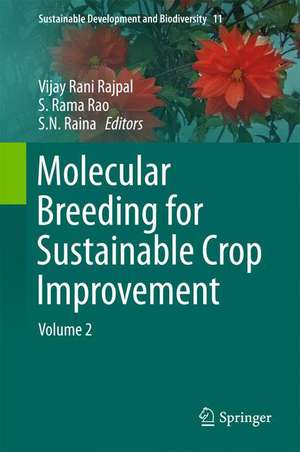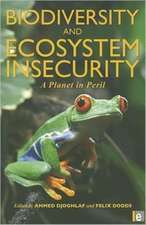Molecular Breeding for Sustainable Crop Improvement: Volume 2: Sustainable Development and Biodiversity, cartea 11
Editat de Vijay Rani Rajpal, S. Rama Rao, S.N. Rainaen Limba Engleză Hardback – 12 feb 2016
| Toate formatele și edițiile | Preț | Express |
|---|---|---|
| Paperback (1) | 799.51 lei 38-44 zile | |
| Springer International Publishing – 30 mar 2018 | 799.51 lei 38-44 zile | |
| Hardback (1) | 824.15 lei 38-44 zile | |
| Springer International Publishing – 12 feb 2016 | 824.15 lei 38-44 zile |
Din seria Sustainable Development and Biodiversity
- 18%
 Preț: 962.18 lei
Preț: 962.18 lei - 18%
 Preț: 953.03 lei
Preț: 953.03 lei - 18%
 Preț: 952.09 lei
Preț: 952.09 lei - 18%
 Preț: 1563.72 lei
Preț: 1563.72 lei - 18%
 Preț: 1133.34 lei
Preț: 1133.34 lei - 18%
 Preț: 1219.63 lei
Preț: 1219.63 lei - 18%
 Preț: 1572.88 lei
Preț: 1572.88 lei - 24%
 Preț: 796.33 lei
Preț: 796.33 lei - 24%
 Preț: 1564.50 lei
Preț: 1564.50 lei - 18%
 Preț: 1412.20 lei
Preț: 1412.20 lei - 18%
 Preț: 1669.03 lei
Preț: 1669.03 lei - 18%
 Preț: 955.08 lei
Preț: 955.08 lei - 24%
 Preț: 824.66 lei
Preț: 824.66 lei - 24%
 Preț: 1052.06 lei
Preț: 1052.06 lei - 24%
 Preț: 900.85 lei
Preț: 900.85 lei - 24%
 Preț: 903.56 lei
Preț: 903.56 lei - 18%
 Preț: 1391.97 lei
Preț: 1391.97 lei - 15%
 Preț: 646.11 lei
Preț: 646.11 lei - 15%
 Preț: 645.60 lei
Preț: 645.60 lei - 24%
 Preț: 794.73 lei
Preț: 794.73 lei - 15%
 Preț: 705.51 lei
Preț: 705.51 lei - 24%
 Preț: 786.67 lei
Preț: 786.67 lei - 24%
 Preț: 983.36 lei
Preț: 983.36 lei - 18%
 Preț: 1559.80 lei
Preț: 1559.80 lei - 18%
 Preț: 1398.14 lei
Preț: 1398.14 lei - 18%
 Preț: 1416.47 lei
Preț: 1416.47 lei - 18%
 Preț: 1575.88 lei
Preț: 1575.88 lei - 18%
 Preț: 1400.50 lei
Preț: 1400.50 lei - 18%
 Preț: 953.20 lei
Preț: 953.20 lei - 20%
 Preț: 578.05 lei
Preț: 578.05 lei - 24%
 Preț: 820.37 lei
Preț: 820.37 lei - 20%
 Preț: 583.95 lei
Preț: 583.95 lei
Preț: 824.15 lei
Preț vechi: 1084.40 lei
-24% Nou
Puncte Express: 1236
Preț estimativ în valută:
157.72€ • 171.26$ • 132.48£
157.72€ • 171.26$ • 132.48£
Carte tipărită la comandă
Livrare economică 18-24 aprilie
Preluare comenzi: 021 569.72.76
Specificații
ISBN-13: 9783319270883
ISBN-10: 3319270885
Pagini: 478
Ilustrații: XI, 478 p. 56 illus., 12 illus. in color.
Dimensiuni: 155 x 235 x 32 mm
Greutate: 1.09 kg
Ediția:1st ed. 2016
Editura: Springer International Publishing
Colecția Springer
Seria Sustainable Development and Biodiversity
Locul publicării:Cham, Switzerland
ISBN-10: 3319270885
Pagini: 478
Ilustrații: XI, 478 p. 56 illus., 12 illus. in color.
Dimensiuni: 155 x 235 x 32 mm
Greutate: 1.09 kg
Ediția:1st ed. 2016
Editura: Springer International Publishing
Colecția Springer
Seria Sustainable Development and Biodiversity
Locul publicării:Cham, Switzerland
Public țintă
GraduateCuprins
Preface.- 1. Use of alien genetic variation for wheatimprovement; P.K. Gupta.- 2.Quantitative trait loci mapping in plants: concepts and approaches; D. Sehgal.- 3. Developing and deployingabiotic stress tolerant maize varieties in the tropics: challenges andopportunities; B.M. Prasanna.- 4.Harnessing apomixes for heterosis breeding in crop improvement; V. Bhat.- 5. Status and opportunities ofmolecular breeding approaches for genetic improvement of tea; R. Kumar Sharma.- 6. Molecularcytogenetic approaches in exploration of important chromosomal landmarks inplants; Y. Mukai.- 7. Technologicaladvances in studying gene pool diversity and its exploitation; S. Goel.- 8. Introgression andexploitation of QTL for yield and yield components from related wild speciesinto rice cultivars; K. Neelam.- 9. Amolecular phylogenetic framework for Timothy (Phleum pratense L.) improvement; A. Stewart.- 10. Genetic improvement of basmati rice – The journeyfrom conventional to molecular breeding; A.K.Singh.- 11. Genetic diversity andcoffee (Coffea sps) improvement inIndia; R.K. Aggarwal.- 12.Introgression and exploitation of biotic stress tolerance from related wildspecies in wheat cultivars; P. Chhuneja.- 13. Genetic improvement ofsugarcane through conventional and molecular approaches; S. Kumar.- 14. Germlinetransformation for crop improvement; R.Tandon.- 15. Advances in molecular breeding of pearl millet; D. Sehgal.- 16. Molecular marker-basedselection tools in spring bread wheat improvement: CIMMYT experience andprospects; S. Dreisigacker.- Index.
Notă biografică
Raina’s quality research is evidenced by his publications in journals of international repute like Gene, AOB Plants, Applied Biochemistry and Biotechnology, Molecular Breeding, Molecular Phylogenetics and Evolution, Theoretical and Applied Genetics, Genome, Plant Breeding, Euphytica, Genetica, Heredity, Journal of Heredity, Cytogenetic and Genome Research, Methods in Cell Science, In Vitro Cell. Dev. Biol. – Plants, Plant Systematics and Evolution, Molecular Phylogenetics and Evolution, Caryologia, Genetic Resources and Crop Evolution, Plant Cell Reports, Annals of Botany among others. He has 135 publications, including 111 research papers, and 20 book chapters. The impact factor of his published papers ranges from 0.5 to 4.5 and the citation index touches nearly 2000. Raina has given invited seminars and keynote addresses in scientific forums in many countries, and has chaired symposia, seminars and scientific sessions in national and international conferences. He is aFellow of National Academy of Sciences (F.N.A.Sc), India, and is credited with 17 M.Phil and 23 Ph.D. thesisDr Rani has published 20 research papers in international peer reviewed journals like Plant Cell Reports, Genome, Genetica, Plant Systematics and Evolution, In Vitro Cellular Developmental Biology (IVCDB) Plant , Genetic Resources and Crop Evolution, Applied Biochemistry and Biotechnology . In addition, she has contributed five review papers in books published from Springer Verlag and Kluwer Acad. Publ. and CRC Press Ltd. Dr Rani has presented her research as an invited speaker in many national and international conferences. She is a member of International Society of Plant Morphologists and NewYork Academy of Sciences, USARao's research activity has been published (and still is) in international renowned journals.
Textul de pe ultima copertă
Molecular Breedingfor Sustainable Crop Improvement, Volume 2 focuses on integration of advances in genetics, cytogenetics, molecular biology andbiotechnology aimed at alien gene introgression for genetic improvement ofmajor crop species at molecular level to help overcome the limitationsassociated with conventional plant breeding.
This book includes articles on the availabilityand application of modern genomic approaches, tools, and resources in aprecision breeding approach. The contributions involve theuse of molecular markers andlinkage, QTL and association mapping of agronomic traits to identify candidategenes and to design functional markers for marker assisted selection (MAS), genepyramiding using MAS coupled with marker assisted back cross breeding (MABB), nextgeneration sequencing (NGS) to generate genome wide markers and screen newalleles, and targeting induced local lesionsin genomes (TILLING) or ecotype TILLING (EcoTILLING) for the screening ofeither mutant or natural germplasm collections to integrate genomicinformation into directional and selective breeding in crops to maximizegenetic gains.
Breeders, taxonomists, geneticists,cytogeneticists, molecular biologists and biotechnologists are going to greatlybenefit from this book. We sincerely hope that this book will serve as amilestone in the precision breeding of crops to achieve meaningful plantgenetic improvement.
This book includes articles on the availabilityand application of modern genomic approaches, tools, and resources in aprecision breeding approach. The contributions involve theuse of molecular markers andlinkage, QTL and association mapping of agronomic traits to identify candidategenes and to design functional markers for marker assisted selection (MAS), genepyramiding using MAS coupled with marker assisted back cross breeding (MABB), nextgeneration sequencing (NGS) to generate genome wide markers and screen newalleles, and targeting induced local lesionsin genomes (TILLING) or ecotype TILLING (EcoTILLING) for the screening ofeither mutant or natural germplasm collections to integrate genomicinformation into directional and selective breeding in crops to maximizegenetic gains.
Breeders, taxonomists, geneticists,cytogeneticists, molecular biologists and biotechnologists are going to greatlybenefit from this book. We sincerely hope that this book will serve as amilestone in the precision breeding of crops to achieve meaningful plantgenetic improvement.
Caracteristici
Provides up to date comprehensive information on the utilization of genetic resources and strategies used in the genetic improvement of various crop species Is unique to combine biodiversity, genetics, cytogenetics, biosystematics, breeding and biotechnology Chapters written by world authorities of their subject Includes supplementary material: sn.pub/extras






